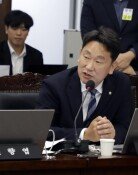Teachers Union Violated Investment Directives
Teachers Union Violated Investment Directives
Posted March. 08, 2006 03:07,
It was pointed out that the Korea Teachers Credit Union (KTCU) violated internal regulations by investing on a large scale from May last year in Y corporation, owned by the same Y who played golf with Prime Minister Lee Hae-chan on March 1.
That is because the directive regulating how the KTCU selects investment items stipulates that the organization is not allowed to invest in items which have possible problems, including unfair transactions and manipulation.
Arrested in September 2001 on charges of manipulating the stock price of Y company, which he was leading, and gaining 20 billion won in profit from 2000 to 2001, Y was sentenced to 18 months in jail and four billion won in fines. He served his sentence and was released in 2003.
Under these circumstances, shares of Y company are an item that runs the risk of unfair transactions and manipulation which directives prohibit investment in.
Regarding this, Jang Yong-nam, a team leader of the KTCU, said, We thought that Ys manipulation is part of the corruption in many companies that was revealed during the financial crisis in the 1990s, adding, We invested in the company for investment profit and believed that the investment did not violate the directives.
But most of the fund managers who are responsible for actual investment in banks, securities companies, and asset management companies, said that it was inappropriate investment.
A fund manager at a security company said, Considering the purpose of KTCUs investment directives which put a limit on investment items, the investment in Y company can be controversial enough.
Most fund managers at asset management companies said, The president of Y company served a jail term on charges of manipulation, and the company is a small firm which posts less than one billion won in daily transaction amounts and is capitalized at 10.4 billion won, saying, The KTCU invested too much in an item in which institutions would be reluctant to invest in, even if there were no legal problems.
Im-Sook Ha Sang-Hoon Kim artemes@donga.com corekim@donga.com







